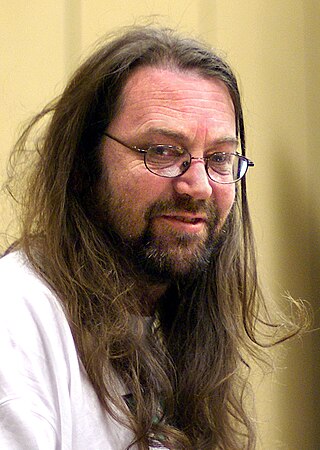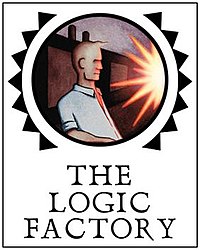
Amiga is a family of personal computers produced by Commodore from 1985 until the company's bankruptcy in 1994, with production by others afterward. The original model is one of a number of mid-1980s computers with 16-bit or 16/32-bit processors, 256 KB or more of RAM, mouse-based GUIs, and significantly improved graphics and audio compared to previous 8-bit systems. These include the Atari ST—released earlier the same year—as well as the Macintosh and Acorn Archimedes. The Amiga differs from its contemporaries through custom hardware to accelerate graphics and sound, including sprites, a blitter, and four channels of sample-based audio. It runs a pre-emptive multitasking operating system called AmigaOS.

Jeff Minter is an English video game designer and programmer who often goes by the name Yak. He is the founder of software house Llamasoft and has created dozens of games during his career, which began in 1981 with games for the ZX80. Minter's games are shoot 'em ups which contain titular or in-game references demonstrating his fondness of ruminants. Many of his programs also feature something of a psychedelic element, as in some of the earliest "light synthesizer" programs including Trip-a-Tron.

Revolution Software Limited is a British video game developer based in York, founded in 1989 by Charles Cecil, Tony Warriner, David Sykes and Noirin Carmody. Its most popular line of games is that of Broken Sword, a series which began in 1996 with Broken Sword: The Shadow of the Templars. As of 2024, there have been a further four iterations in the series: The Smoking Mirror (1997), The Sleeping Dragon (2003), The Angel of Death (2006) and The Serpent's Curse (2013).

Doom II, also known as Doom II: Hell on Earth, is a first-person shooter game in the Doom franchise developed by id Software. It was released for MS-DOS in 1994 and Mac OS in 1995. Unlike the original Doom, which was initially only available through shareware and mail order, Doom II was sold in stores.
Broken Sword is a series of adventure games. The first game in the series, Broken Sword: The Shadow of the Templars, was released and developed in 1996 by British developer Revolution Software. Its sequel, Broken Sword II: The Smoking Mirror, was released a year later, and was followed by Broken Sword: The Sleeping Dragon in 2003, Broken Sword: The Angel of Death in 2006, and Broken Sword 5: The Serpent's Curse in 2013. A remake of the first game in the series, known as Broken Sword: Shadow of the Templars – The Director's Cut, was released in 2009, and a remake of the second game in the series, Broken Sword: The Smoking Mirror – Remastered, in 2010 for iOS devices; other platforms followed in 2011.

Ascendancy is a 4X science fiction turn-based strategy computer game. It was originally released for MS-DOS in 1995 and was updated and re-released for iOS in 2011 by The Logic Factory. Ascendancy is a galactic struggle to become the dominant life form, hence the title. The game's introductory cinematic states: "Wildly different cultures competed for the same worlds. In the enormous upheaval that followed, one of these species would gain ascendancy."

CryEngine is a game engine designed by the German game developer Crytek. It has been used in all of their titles with the initial version being used in Far Cry, and continues to be updated to support new consoles and hardware for their games. It has also been used for many third-party games under Crytek's licensing scheme, including Sniper: Ghost Warrior 2 and SNOW. Warhorse Studios uses a modified version of the engine for their medieval RPG Kingdom Come: Deliverance. Ubisoft maintains an in-house, heavily modified version of CryEngine from the original Far Cry called Dunia, which is used in their later iterations of the Far Cry series. The Dunia engine would in turn be further modified and used in games such as The Crew 2.

American Megatrends Inc., doing business as AMI, is an international hardware and software company, specializing in PC hardware and firmware. The company was founded in 1985 by Pat Sarma and Subramonian Shankar. It is headquartered in Building 800 at 3095 Satellite Boulevard in unincorporated Gwinnett County, Georgia, United States, near the city of Duluth, and in the Atlanta metropolitan area.

Windows Mobile is a discontinued mobile operating system developed by Microsoft for smartphones and personal digital assistants (PDA). Designed to be the portable equivalent of the Windows desktop OS in the emerging mobile/portable area, the operating system is built on top of Windows CE and was originally released as Pocket PC 2000.
Linux Game Publishing was a software company based in Nottingham in England. It ported, published and sold video games running on Linux operating systems. As well as porting games, LGP also sponsored the development of Grapple, a free software network library for games. As well as acting as a Linux game porter in of themselves, they also functioned as a publisher for other Linux game developers and porters. The company was dissolved on 3 May 2011.
Mac gaming refers to the use of video games on Macintosh personal computers. In the 1990s, Apple computers did not attract the same level of video game development as Microsoft Windows computers due to the high popularity of Windows and, for 3D gaming, Microsoft's DirectX technology. In recent years, the introduction of Mac OS X and support for Intel processors has eased the porting of many games, including 3D games through use of OpenGL, and more recently, Apple's own Metal API API. Virtualization technology and the Boot Camp dual-boot utility also permit the use of Windows and its games on Macintosh computers. Today, a growing number of popular games run natively on macOS, though as of early 2019, a majority still require the use of Microsoft Windows.

The Pippin is a defunct open multimedia technology platform, designed by Apple Computer. According to Apple, Pippin was directed at the home market as "an integral part of the consumer audiovisual, stereo, and television environment".
Ronimo Games was a Dutch video game developer founded in 2007 by former students of the Utrecht School of the Arts.
Duke Nukem is a media franchise named for its main character, Duke Nukem. Created by the company Apogee Software Ltd. as a series of video games for personal computers, the series expanded to games released for various consoles by third-party developers. The first two games in the main series were 2D platformers, while the later games have been a mix of first-person and third-person shooters.

Spacetime Studios (STS) is a games development studio, based in Austin, Texas. Founded in 2005 by a small group of PC MMO game developers. The start-up was created with the aim to create Sci-Fi MMOs for the PC market.

Terraria is a 2011 action-adventure sandbox game developed by Re-Logic. The game was first released for Windows and has since been ported to other PC and console platforms. The game features exploration, crafting, building, painting, and combat with a variety of creatures in a procedurally generated 2D world. Terraria is one of the best-selling video games of all time, selling 58.7 million copies as of 2024.

Broken Age is a point-and-click adventure video game developed and published by Double Fine. Broken Age was game director Tim Schafer's first return to the genre since 1998's Grim Fandango, and was released for Microsoft Windows, macOS, Linux, iOS, Android, PlayStation 4, PlayStation Vita, and Xbox One platforms. The game was developed in two acts; the first was released on January 28, 2014, and the second was released on April 28, 2015. A retail version of the complete game for Windows, macOS, and Linux, published by Nordic Games, was released on April 28, 2015. A Nintendo Switch version was released on September 13, 2018.

Vainglory is a free-to-play multiplayer online battle arena (MOBA) video game, developed and published by Super Evil Megacorp for iOS, Android and PC. As many games in its genre, Vainglory's gameplay focuses on player versus player battles, with players split into two teams of three or five with the ultimate goal of destroying the opposing team's base. The game was released for iOS on November 16, 2014, after being soft-launched for over half a year, with the Android version being released on July 2, 2015. A Mac and Microsoft Windows version of the game was released in July 2018. Through cross-platform play, players on all four platforms can play together simultaneously.
Re-Logic is an American independent game developer and publisher based in Indiana in the USA. It was founded by Andrew Spinks in 2011. The company is best known for developing and publishing Terraria, a 2D action-adventure sandbox video game. Re-Logic published Pixel Piracy and Pixel Privateers, both being developed by Quadro Delta.












